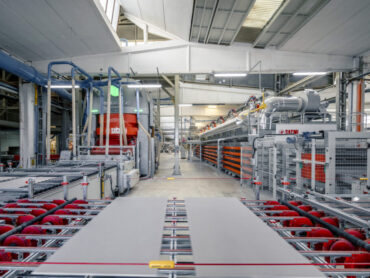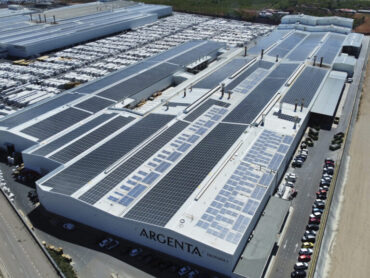Two new Sacmi/Gaiotto robotized glazing cells for Caesar Sanitaryware Jsc Vietnam
Vietnamese company makes a new investment characterised by efficiency, low consumption and eye-catching design.
In Vietnam for over 20 years, the Caesar Sanitaryware Co. Ltd, which has its administrative offices in Taipei (Taiwan), develops and manufactures complete bathroom product lines that include everything from ceramics to faucets and bathtubs; today, it is one of Vietnam’s top three sanitaryware manufacturers, with sales on the rise both in Vietnam and worldwide.
With a steadily growing output capacity, currently in excess of a million pieces per year, Caesar Sanitaryware is constantly investing in modern machinery and advanced technological research. Their goal is to improve product quality while bettering efficiency, lowering water consumption and giving their products a distinctively modern, eye-catching look.
It is this innovation-driven philosophy that has led Caesar Sanitaryware to sign a contract with Sacmi for the installation and testing of two automatic glazing lines at their plant in Ho Chi Minh City. Equipped with Gaiotto GA2000 and GA/OL robots, the lines also feature innovative dry filters for the spraying booths and new GDA80 spray guns.
The first glazing cell uses the tried and tested technology of the GA2000 robot, that is, a glazing robot that features not just self-learning but other consolidated programming functions (such as point-to-point and the formidable OFFLINE 7WD system, developed internally by Gaiotto engineers).
The second glazing cell, instead, has a GA/OL robot. While constructed on the same kinematics as the GA 2000, this machine is specifically dedicated to utilisation of OFFLINE 7WD software to create offline spraying programmes. Using OFFLINE 7WD software has innumerable advantages, such as:
optimised cell efficiency, as there is no need to use the cell in production tests that would otherwise reduce efficiency in terms of actual manufacturing hours;
increased surface quality thanks to accurate glaze thickness control;
considerably less over-spray, with consequent glaze savings and shorter cycle times thanks to the elimination of wasteful multiple sweeps over already-sprayed areas.
The philosophy behind implementing robotics in Caesar’s glazing department is as follows: to have one line equipped with GA2000 robots – to allow for ultra-fast, self-learning programme creation, allowing new articles to be put into production quickly or tests to be performed on a limited number of pieces – and the remaining glazing lines equipped with GA/OL robots that can operate with programmes created in self-learning mode by the GA2000 or with optimised programmes developed using offline techniques.
Both glazing cells have identical layouts: the glazing robot is positioned at the centre of a 4-position carousel which transfers sanitaryware items from the loading zone to the glazing booth in just five seconds. Piece loading/unloading on the 4-position carousel consists of a 4-station bar conveyor system to load pieces and a parallel belt conveyor to unload glazed pieces. Transfer from the conveyor to the rotary carousel occurs by way of an angular conveyor with 3 degrees of freedom. The glazed article foot cleaning device – with automatic sponging roller – is mounted on the parallel belts conveyor.
Caesar’s technicians have also focused on innovation by applying (on both glazing lines) spray booth self-cleaning dry filter systems. The latter provide multiple advantages: recovery of glaze scattered by spray guns, lower maintenance and cleaning costs, elimination of filter wash waste waters and, consequently, huge savings on sludge recovery and disposal.
CERSANIT Poland has chosen the cutting edge Sacmi casting technology
New AVI high pressure integrated casting centre for WCs tested at Krasnystaw.
The CERSANIT Group recently purchased – from SACMI, of course – and tested an AVI integrated casting centre for the high-pressure casting of complex WCs.
CERSANIT has chosen to equip its plant in Krasnystaw, Poland, with the most advanced technology available (state-of-the-art in terms of casting and pre-drying). This highly innovative technology is particularly suitable for the manufacture of complex WCs at medium production levels.
This latest acquisition sees Cersanit begin a capacity expansion process for high-range articles that is characterised by a sharp focus on cost containment and user-friendly manufacturing/maintenance.
The AVI casting centre revolutionises the casting machine concept. The mould is mobile and moved by a robot that carries out all operations in complete autonomy. Hence the machine tag AVI, in which the A stands for Alta pressione (High pressure), the V for Vasi (WCs) and the I for Indipendenti (Independent).
The integrated casting centre is thus extremely simple, with the leading role being played by the robot.
In addition to the usual tasks, in fact, the robot can also move all the mould parts, including the mould as a whole: this ensures model changeovers require only minimal amounts of time and manual work.
Bearing in mind the importance of this part of the plant, SACMI has decided to employ a 700 kg FANUC M-900i/B robot.
The section needed to execute casting includes 2 mould clamping units, complete with 2 rim holder devices (i.e. suitable for the simultaneous casting of 2 pieces).
Casting accessories are single, simplified units: the fluids control unit, the slip and glue tanks, the sump water intake system, the wall-mounted WC overturning system and all the relative tools.
Moreover, just-demoulded pieces are, after initial inspection and sponge-finishing, treated in the FPV chamber to aid the hardening needed to allow their manual handling.
In the FPV acronym the P stands for Pre-dryer, F for Finishing and V for Vertical: this ventilated chamber can treat 4 just-demoulded pieces and execute initial maturing at controlled temperature and humidity. The pieces, positioned on polyurethane supports, undergo an initial consolidation stage: this lasts about 90 minutes and reduces moisture content by 2% or thereabouts.
This moisture-losing process (and the associated controlled shrinkage) significantly reduces the risk of pre-drying cracks, a problem that can, above all, affect WCs of complex shape and size.
In short, the AVI integrated casting centre introduces technological innovations that confirm the SACMI Group’s position as the world’s leading ceramic plant engineering provider.
BETTA SANITARYWARE (South Africa) strengthens its partnership with SACMI/GAIOTTO
March 2017 saw the start-up of a Sacmi/Gaiotto automatic glazing cell.
Betta Sanitaryware, one of South Africa’s biggest ceramic manufacturers, has been using Gaiotto robots since 1997. With an output that has, over the years, risen to some 2 million pieces/year, the firm is now Africa’s biggest sanitaryware manufacturer.
Continuous investment in automatic glazing, and automation in general (a strategy extremely dear to CEO Lance Foxcroft), has now led to the installation of an all-new Sacmi/Gaiotto glazing system, perfectly in keeping with the company’s strong focus on innovation.
This extremely flexible plant, which is suitable for all sanitaryware models, features a booth concept in which extraction depends on the position of the piece being processed and a handling robot works in concert with two Gaiotto GA2000 robots – all controlled via an alphanumeric panel via which the operator can control the entire set-up and act on every single stage of the process.
Use of the new Gaiotto-developed GDA80 spray gun, controlled by the integrated mass control device (a key factor in Betta’s purchase decision), together with installation of the new glazing booth with dry filters, ensure there is little need for wear-related spare parts and lower water consumption.
Despite the innovativeness of the solution, start-up was, as with previous plants, completed in just a week, further proof of just how quickly and easily Sacmi/Gaiotto technology can be installed and started up. Yet another solution, then, that confirms the Group’s role as a premium partner, listening carefully to customers’ needs so they can be satisfied in full.
Novellini SpA gets a makeover with Sacmi-Gaiotto.
Key customer receives two new GA2000 glass fibre laying robots.
Renewal of the Novellini SpA production facilities in Borgoforte (Mantova) continues. Now, to complete the process, this world-leading manufacturer of shower and hydro-massage cubicles has turned to Gaiotto Automation, the Sacmi Imola S.C. company that specialises in providing automated processes.
Gaiotto Automation, founded in 1967 and based in the mechatronic hub of Piacenza, has always been guided by a clear three-point philosophy: constant customer support, the development of lasting partnerships and ongoing renewal of the machine pool.
With this latest order, Gaiotto technicians have replaced two industrial robots, actually installed by Gaiotto Automation back in 1998, the year we began doing business with the company (founded by Gianfranco Novellini in the early ’80s). The old GA900s have been replaced with two new GA2000s featuring integrated mass-control. This innovative system, which manages the glass fibre laying process, allows for flexible control of consumption, a keystone of Novellini SpA policy.
The last stage of a renewal plan initiated in 2015, this installation reflects Gaiotto Automation’s increased presence in Novellini’s field of business. Gaiotto Automation, in fact, already has three other robotized systems in this Mantova-based firm, installed over almost 20 years of mutually rewarding business. It is thanks to this partnership that Gaiotto Automation has successfully branched out from its core businesses of industrial and, most importantly, ceramic coating to reinforce its know-how in the strategic glass fibre field.


